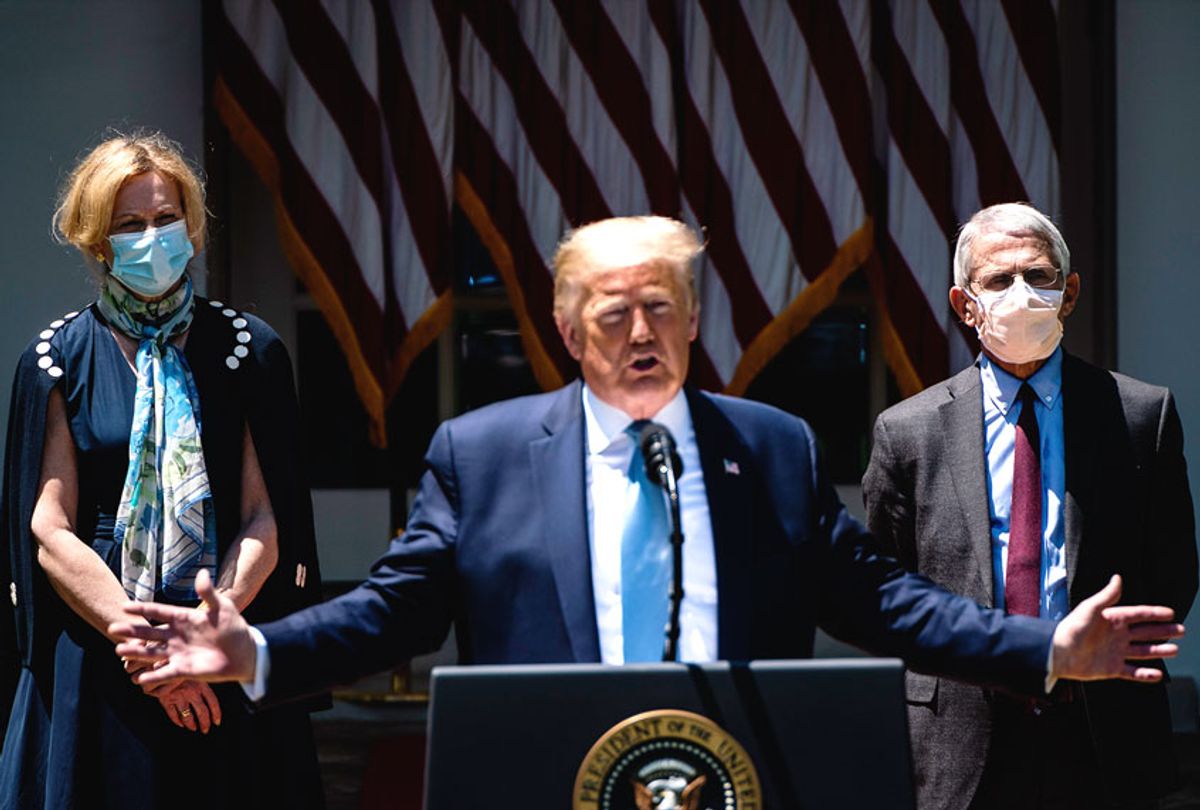President Donald Trump's painfully inadequate response to the coronavirus pandemic has been crushing him in recent election polls: one poll after another has shown him trailing former Vice President Joe Biden, the presumptive Democratic nominee — some of them by double digits. But Politico reporter Adam Cancryn, in an article published on July 22, wonders if perhaps there will be enough progress on a COVID-19 vaccine for Trump to enjoy an "October surprise" that saves his reelection campaign and helps him win a second term.
The World Health Organization's Mike Ryan has said that although "good progress" is being made, it will probably be early 2021 before COVID-19 vaccines start to become available. And Cancryn notes that "Trump's bet that a proven-effective coronavirus vaccine will be the October surprise to catapult him into a second term is facing increasingly long odds." However, the Politico journalist notes, "that doesn't mean he won't find just enough reason to declare victory anyway."
Cancryn explains, "While the race to find an effective vaccine for COVID-19 has crucial implications for nations around the world, it also carries political ramifications in the United States — with Trump banking heavily on finding a vaccine to quell both the pandemic and mounting unhappiness over his handling of the coronavirus response. Buoyed by a series of encouraging early trial results, the (Trump) Administration is laying the groundwork for a high-profile rollout of initial coronavirus vaccines in as little as three months. It's a best-case timetable that also tracks with the final weeks before the November 3 election."
According to Cancryn, the Trump White House's Operation Warped Speed "has poured billions of dollars into developing a vaccine in record time, funding several efforts in parallel and buying up doses of the experimental shots in a wager that one will ultimately pay off."
Cancryn reports that "several top vaccine experts" told Politico it could "take well into 2021 to produce and distribute the hundreds of millions of shots needed to inoculate the entire country." However, the reporter wonders if early clinical trials could give Trump "the opportunity to seize on them as a potential game-changer."
"While the Trump Administration has insisted that it won't cut corners on safety — a vow the vaccine developers have taken as well — it's left the door open to short-circuiting the process before those trials are complete," Cancryn reports. "The (Food and Drug Administration) guidelines indicate the Administration could issue emergency authorizations as soon as it's convinced a vaccine is safe and effective, clearing it for distribution to the public."
John Moore, a professor of microbiology and immunology at Weill Cornell Medical College, is among the medical experts who is worried that a COVID-19 vaccine will be rushed rather than adequately tested.
Moore told Politico, "That's the concern — not that Trump might boost his poll ratings by a couple percent, but that we could make a catastrophic mistake. Anything in October is going to be politicized, and the last thing this pandemic needs is more politicization."
Barry Bloom, an infectious disease expert at Harvard University, told Politico, "There is clearly a political goal for the president to say, 'I've delivered a vaccine.' But we will not know in three months, or six months — by January — how long the antibodies last."




Shares